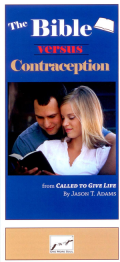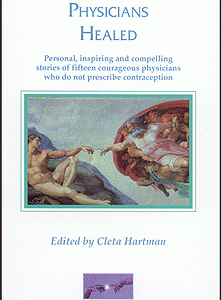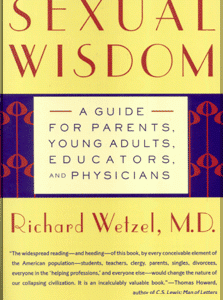What does the Bible say about contraception?
The Second Vatican Council’s statement on Divine Revelation teaches us that interpretation of the Sacred Scriptures must devote attention to “the content and unity of the whole of scripture, taking into account the tradition of the entire Church…”1 Much more than a moral manual or a doctrinal concordance, the Bible is an inspired expression of the faith and life of the Church. In contrast to the legalism of the Pharisees, the revelation of Christ was/is comprehensive, describing the positive fulfillment of the demands of love. Our application of this revelation to the specific moral questions of our age, in this case contraception, involves submitting our actions to the standard of life-giving love established by God, both in his fathering of the chosen people of old, and in his redemption of the New Israel.
The morality of contraception must be viewed in this light, that is, in the light of God’s ineffable love for human life and his plan for its transmission. Looking to the Bible for guidance on the issue of contraception must consider the Bible’s revelation of the sovereignty of God over creation and His plan for marriage. It must also recognize that Scripture reveals children as the supreme gift of marriage and a blessing from God.
Subverting the sovereignty of God: the deliberate act of rendering a sexual act infertile.
Genesis 38:8-10
The Bible contains teachings relevant to contraception on a variety of levels. The most direct of these references is Genesis 38:8-10, the Onan Incident:
Then Judah said to Onan, “Go in to your brother’s wife, and perform your duty as a brother-in-law to her, and raise up offspring for your brother.” And Onan knew that the offspring would not be his; so it came about that when he went in to his brother’s wife, he wasted his seed on the ground, in order not to give offspring to his brother. But what he did was displeasing in the sight of the Lord, so He took his life also.
Though God was certainly displeased with Onan’s disobedience to the Levirate Law: that is, the obligation of a man to sow children with his dead brother’s widow, his punishment for Onan far exceeded the penalty mandated for such a crime. According to Deuteronomy 25:5-10, the penalty is for the slighted widow to publicly humiliate the offender. God’s enactment of the death penalty for Onan indicates a heightened seriousness in the offense. The only additional element to Onan’s refusal to provide offspring is his choice to make the sexual act deliberately infertile by withdrawal.
That Onan’s punishment was due to his use of contraception is pointed out by Pope Pius XI in his encyclical Casti Connubii:
Small wonder, therefore, if Holy Writ bears witness that the Divine Majesty regards with greatest detestation this horrible crime [contraception] and at times has punished it with death. As St. Augustine notes, ‘Intercourse even with one’s legitimate wife is unlawful and wicked where the conception of the offspring is prevented. Onan, the son of Judah, did this and the Lord killed him for it’ (55).
Even the most notable Protestant theologians agree on this point. Martin Luther, for example, equates Onan’s action with sodomy:
Onan must have been a malicious and incorrigible scoundrel. This is a most disgraceful sin…We call it unchastity, yes, a Sodomitic sin. For Onan goes in to her; that is, he lies with her and copulates, and when it comes to the point of insemination, spills the semen, lest the woman conceive. Surely at such a time the order of nature established by God in procreation should be followed (Commentary on Genesis 38: 8-10).2
Likewise, John Calvin, founder of Calvinism and other sects of Calvinist extraction such as Presbyterians and the United Church of Christ, calls Onan’s withdrawal “monstrous”:
Besides, he [Onan] not only defrauded his brother of the right due him, but also preferred his semen to putrify on the ground, rather than to beget a son in his brother’s name. The voluntary spilling of semen outside intercourse between man and woman is a monstrous thing. Deliberately to withdraw from coitus in order that semen may fall on the ground is doubly monstrous (Commentary on Genesis 38: 8-10).3
Offspring are the supreme gift of marriage, a blessing from God through which God is revealed to the world.
Genesis 1:27-28
“God created man in his image, in the divine image he created him; male and female he created them. God blessed them, saying: ‘Be fruitful and multiply; fill the earth and subdue it.'”
Genesis 9:1
“God blessed Noah and his sons and said to them: ‘Be fertile and multiply and fill the earth.'”
Guadium et Spes, the Second Vatican Council’s Pastoral Constitution on the Church in the Modern World, discusses God’s primordial plan for marriage and its natural openness to fertility:
Children are the supreme gift of marriage and contribute greatly to the good of the parents themselves. God himself said: ‘It is not good that man should be alone,’ and ‘from the beginning [he] made them male and female’; wishing to associate them in a special way in his own creative work, God blessed man and woman with the words: ‘Be fruitful and multiply.’ Hence, true married love and the whole structure of family life which results from it, without diminishment of the other ends of marriage, are directed to disposing the spouses to cooperate valiantly with the love of the Creator and Savior, who through them will increase and enrich his family from day to day (no. 50).
Endowed with the gift and responsibility to participate in God’s redemption of humanity, the married couple perpetuates and projects the image and likeness of God in its transmission of life. In his explanation of the vows of Catholic marriage and the question as to whether the new couple will accept children from the Lord, Pope John Paul II teaches:
“When the Church asks ‘Are you willing?’ she is reminding the bride and groom that they stand before the creative power of God. They are called to become parents, to cooperate with the Creator in giving life. Cooperating with God to call new human beings into existence means contributing to the transmission of that divine image and likeness of which everyone ‘born of a woman’ is a bearer.”4
The procreation of children is a further revelation of the image and likeness of God in that it creates a communion of persons, a family, which signifies the communion of persons essential to Christ. “The Christian family is a communion of persons, a sign and image of the communion of the Father and the Son in the Holy Spirit. In the procreation and education of children it reflects the Father’s work of creation” (CCC 2205).
Malachi 2:14-15
“…the Lord is witness between you and the wife of your youth, with whom you have broken faith though she is your companion, your betrothed wife. Did he not make one being, with flesh and spirit: and what does that one require but godly offspring?”
While this verse occurs in the context of a discourse on the infidelity of God’s people to the covenant wherein idolatry is likened to adultery, the point still holds. The analogy would make no sense if offspring were not customarily considered a necessary good of marriage. In other words, it is clear that offspring were considered the natural sign of a one-flesh union.
Catechism Connection: Children Are a Blessing from God
“Sacred Scripture and the Church’s traditional practice see in large families a sign of God’s blessing and the parents’ generosity.” Catechism of the Catholic Church, 2373
Psalm 127:3-5
“Behold sons are a gift from the Lord; the fruit of the womb is a reward. Like arrows in the hand of a warrior are the sons of one’s youth. Happy the man whose quiver is filled with them; they shall not be put to shame when they contend with the enemies at the gate.”
Psalm 128:1-4
“Happy are those who fear the Lord, who walk in his ways! For you shall eat the fruit of your handiwork; happy shall you be, and favored. Your wife shall be like a fruitful vine in the recesses of your home; your children like olive plants around your table. Behold, thus is the man blessed who fears the Lord.”
Exodus 23:25-26
“The Lord, your God, you shall worship; then I will bless your food and drink, and I will remove all sickness from your midst; no woman in your land will be barren or miscarry; and I will give you a full span of life.”
Deuteronomy 7:13-14
“As your reward for heeding these decrees and observing them carefully, the Lord, your God, will keep with you the merciful covenant which he promised on oath to your fathers. He will love and bless and multiply you; he will bless the fruit of your womb.. You will be blessed above all peoples; no man or woman among you shall be childless..”
Not only do these passages portray children as a natural blessing but as a transcendent blessing for fidelity to the covenant. As such, they are the best of what God offers for they are not just the natural reward of a well-ordered life but a divine premium that comes from the inner life of God. Before we receive them, they exist in the mind of God, worthy of his forethought and of his love. The Psalmist says, “Truly you have formed my inmost being; you knit me in my mother’s womb” (Ps 139:13). How could we view children as anything but precious gifts into which God pours his very being-gifts that come from His heart to be received with awe and gratitude?
For this reason “Sacred Scripture and the Church’s traditional practice see in large families a sign of God’s blessing and the parents’ generosity”(CCC 2373). Vatican II likewise teaches, “Among the married couples who thus fulfill their God-given mission, special mention should be made of those who after prudent reflection and joint decision courageously undertake the rearing of a large family” (GS 50).
1 Timothy 2:15
“She will be saved through childbearing, provided she continues in faith and love and holiness-her chastity being taken for granted.”
Here Paul proclaims the great dignity of the vocation of motherhood and its indispensable role in the plan of God for the salvation of parents. St. Paul, moreover, implies that the whole body of Christ benefits from cherishing the transmission of human life; for when a mother cooperates with God in the creation of new life and its Christian formation, she contributes to the building up of the Christian community. By definition, a vocation is a pathway of holiness that exists to fortify the Kingdom of God. Childbearing, depicted by Paul as a vocation, is no exception.
Chemical and hormonal means of contraception and abortion in the New Testament.
Galatians 5:19-20
“Now the works of the flesh are obvious: immorality, impurity, licentiousness, idolatry, sorcery, hatreds…those who do such things will not inherit the kingdom of God.”
Revelation 9:21
“Nor did they repent of their murders, their magic potions, their unchastity, or their robberies.”
Revelation 21:8
“But as for cowards, the unfaithful, the depraved, murderers, the unchaste, sorcerers, idol-worshipers, and deceivers of every sort, their lot is in the burning pool of fire and sulfur, which is the second death.”
Some scholars (cf Kimberly Hahn in Life-Giving Love5) hold that these New Testament words represent, in context, a stinging condemnation of contraception and chemical abortion. Usually translated as “sorcerer” and “sorcery,” they refer more specifically to a mixer of potions or to the potions themselves, medicines that were commonly directed at preventing fertility or at achieving abortion.
The Whole Picture
Putting the whole picture together, we start with God’s “first commandment” to “increase and multiply,” we browse through the Old Testament in which children are seen as some of the best blessings of God and even as a requirement for His people, and we finish with contraceptive practices being classed with “immorality, impurity, licentiousness, and idolatry” and also with “murders, unchastity, and robberies.”
As we try to put on the heart of God, as revealed in the Scriptures, one of the main themes we encounter is His overflowing love for human life and especially for children. The fierce condemnation of immorality and of contraception in particular appear to reflect God’s great desire that people enjoy the full joys and healing that come from loving family life and service to children.
What to do?
All of us are closely connected to people involved with contraception and many of us have used contraceptives or are still doing so. Many of us have been sterilized–the ultimate contraceptive. Knowing now how God approaches these matters, we have a great opportunity to help others to deeper life and to walk this way ourselves.
We are well aware of our weaknesses and others’ as well. The full, abundant life of God, however, is waiting for us and for those we love, provided we open ourselves to it. One important step is simply to talk about the situation, to God, to each other, to a confessor, to a godly friend. If additional information is needed, One More Soul6 has a wide range of teaching materials that can help, as well as recorded testimonies of couples who have struggled with this situation before. There are more people every day who have faced this crisis and come out healed. The possibilities are broad and full of hope.
NOTES:
1 Dei Verbum, no. 12.
2 Provan, Charles D. The Bible and Birth Control. Zimmer Printing. Monongahela, Pennsylvania: 1989, p. 81.
3 Ibid., p. 67.
4 Letter to Families from Pope John Paul II, no. 8.
5 Hahn, Kimberly, Life-Giving Love, Servant Publications, Ann Arbor, Michigan, 1999, p. 67.
6 One More Soul: www.OneMoreSoul.com, OMSoul@OneMoreSoul.com, 800-307-7685.
This pamphlet is drawn from Chapter 2 of Called to Give Life by Jason T. Adams. Jason Adams is a father of five and the Theology Chair at Guerin Catholic High School, Noblesville, Indiana. He serves as Outreach Associate for One More Soul, the publisher of Called to Give Life. He holds the degrees of Bachelor of Arts in Secondary Education from Purdue University, and Master of Arts in Theology and Christian Ministry from the Franciscan University of Steubenville. Jason and Linda have used Natural Family Planning to successfully postpone and achieve pregnancy throughout their marriage, and have shared their testimony to its benefits in Pre-Cana, RCIA, young adult/youth groups, and other venues.







